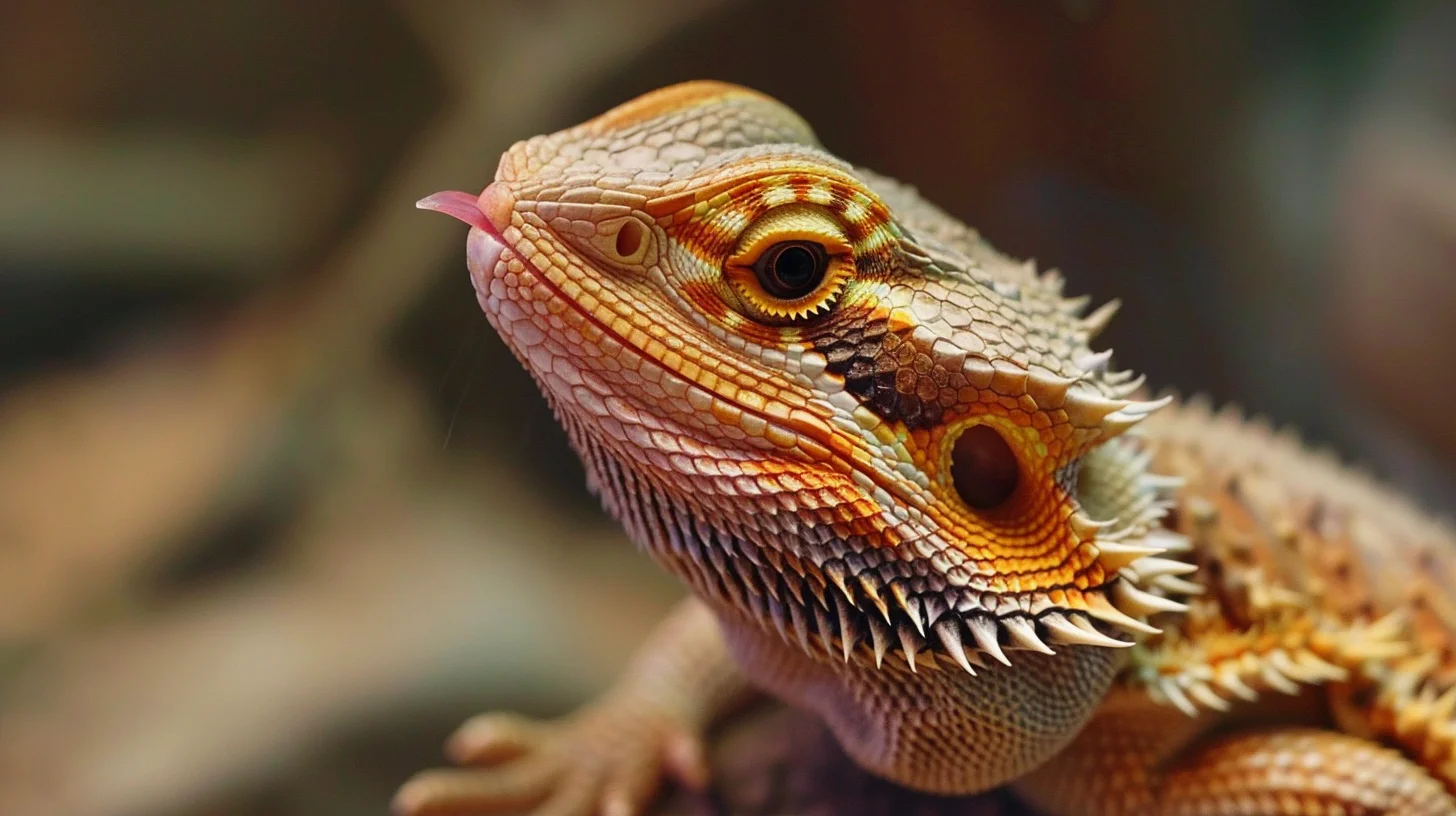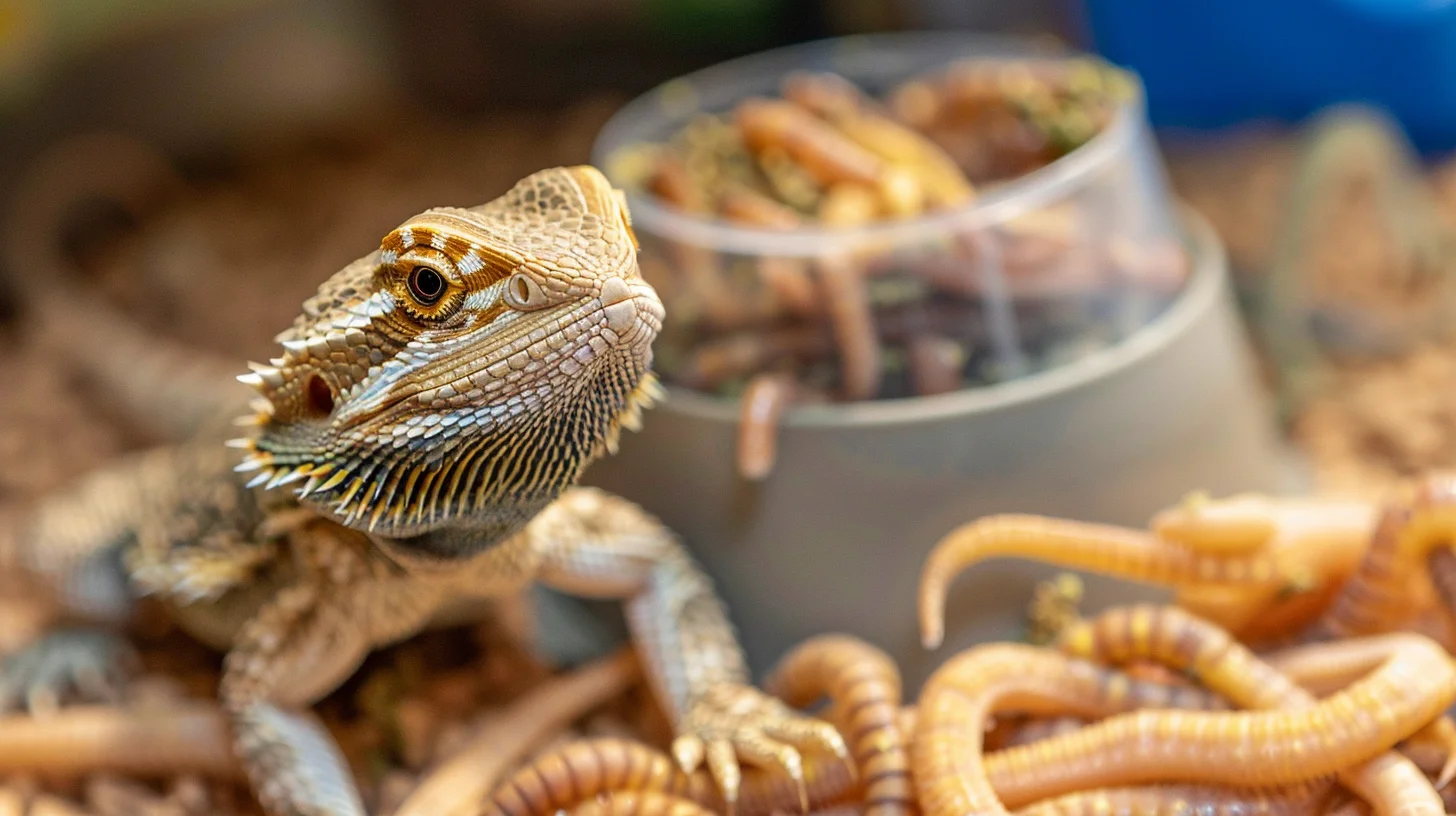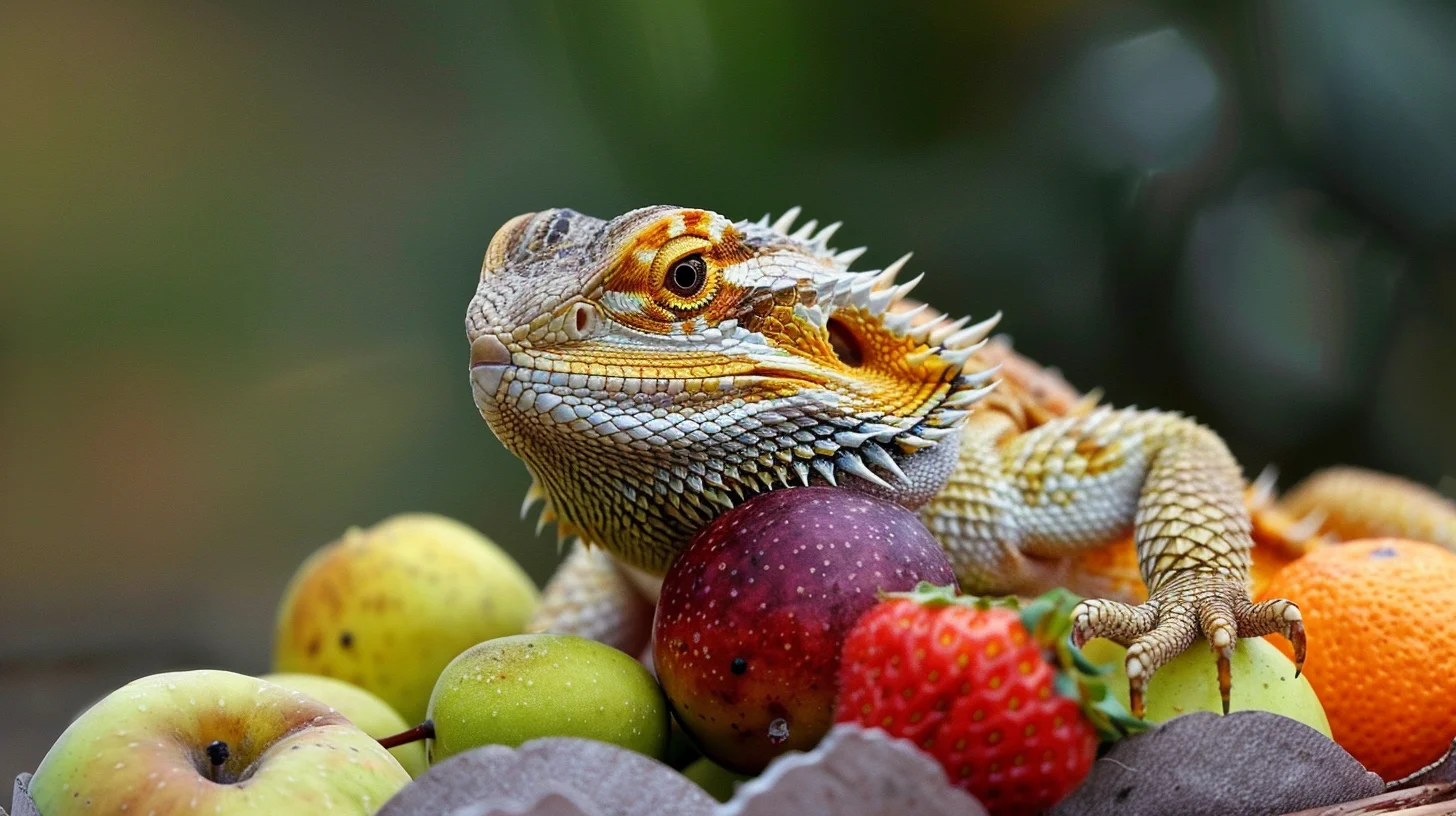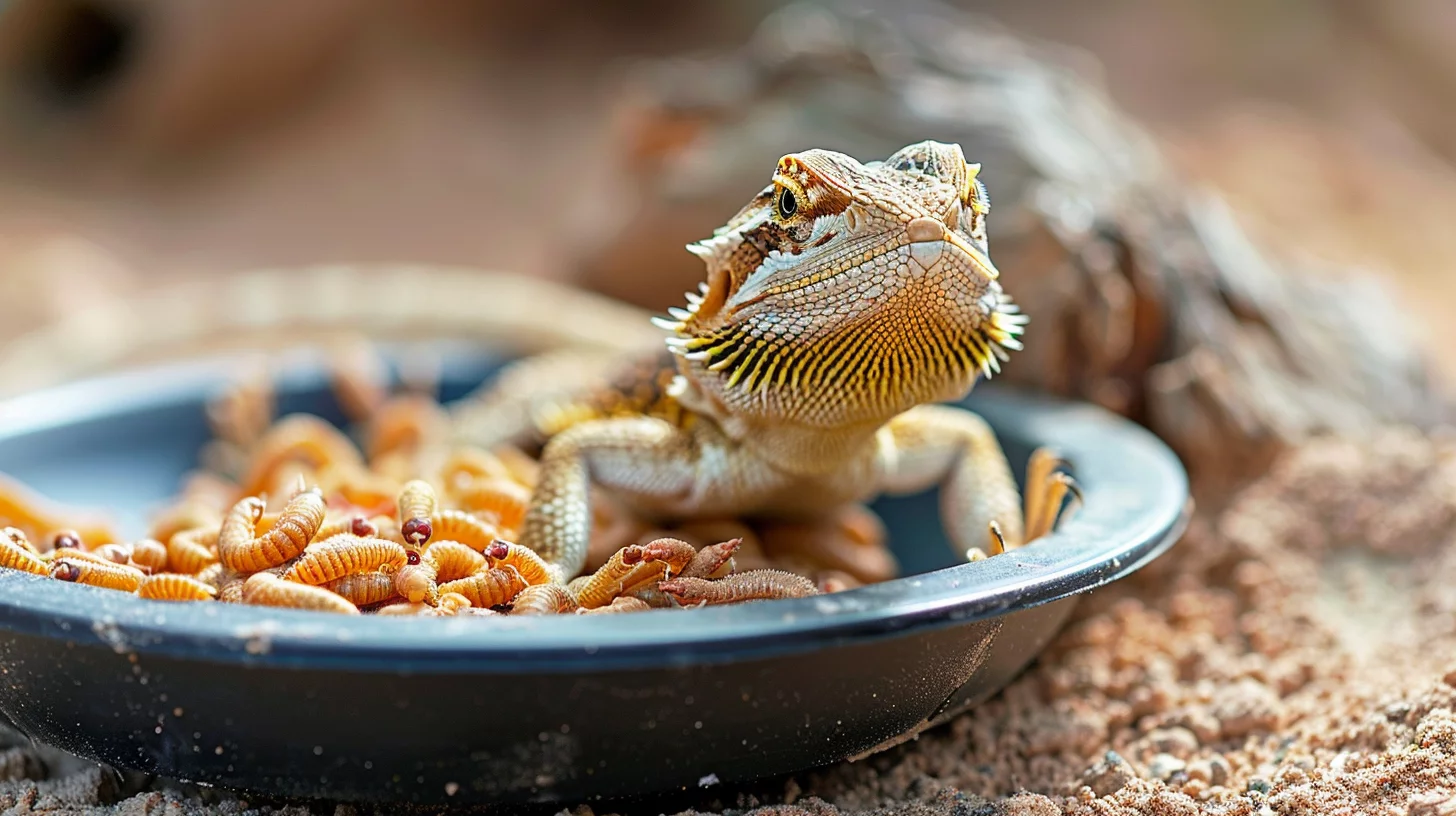Bearded dragons make intriguing pets. With their docile personalities, amenable handling, and endearing behaviors like head bobbing and arm waving, they tend to capture their owners’ hearts. So when your bearded dragon starts flicking its tongue out to lick you, you may wonder why it displays this unusual behavior. So What Does It Mean When a Bearded Dragon Licks You? Let´s find out!
Reasons Why Bearded Dragons Lick Their Owners
A bearded dragon lick can have several possible meanings. These include:
Exploring Scents
Like snakes, bearded dragons utilize their tongues to pick up chemical cues in their environment. By licking objects and owners, bearded dragons gather information about smells around them. Their inquisitive licks allow them to actively explore scents.
Fun Fact: A bearded dragon’s tongue can detect smells just as well as its nose!
A key function of a bearded dragon’s tongue involves chemical sensation and sampling. Their tongues gather scent particles, relaying nerve signals about the chemical makeup of smells around them. This grants further environmental insight beyond vision alone.
Humans primarily use our noses to detect odors. But for bearded dragons, their tongue essentially serves as a supplemental nose. Through tongue flicks, these lizards collect minuscule amounts of chemicals from the air or surfaces. Their tongue then transfers the gathered molecules to the vomeronasal organ (Jacobson’s organ).
This specialized sensory organ analyzes the chemical compounds. Detection of particular pheromones and scents provides bearded dragons valuable information about safety, food availability, territorial markings, potential illness, reproductive status and more in their environments.
Their tongue truly acts as a multipurpose detection tool for navigating the world. So when your bearded dragon licks you, it employs its tongue in the same exploratory manner as it investigates objects in its habitat. The licks represent your bearded dragon’s innate curiosity and sensory abilities.
Signs of Affection
Frequent licks, especially when accompanied by a calm and relaxed demeanor, may signify the bearded dragon feels comfortable and affectionate towards its owner. The licks act similarly to kisses from cats or dogs. This type of licking demonstrates the trust and bond formed between pet and owner.
However, interpreting licks as purposeful signs of affection risks some anthropomorphism. Bearded dragons likely do not kiss their owners out of love the way a dog or primate might. Yet the concept of bonding still comes into play with lick interpretations.
Frequent tongue flicking aimed specifically at owners instead of indiscriminately around the environment suggests some interspecies social attachment. After all, lizards form social hierarchies and can become habituated and responsive to owners who regularly interact with and feed them.
If your bearded dragon seems calm and content when licking you, it likely feels safe and comfortable in your presence – a reasonable proxy for affection. Consistently positive interactions prevent bearded dragons from viewing owners as threats. And the resulting relaxation paired with investigatory licks reasonably indicates trust and familiarity, the foundation for cross-species bonds.
Gathering Nutrients
Bearded dragon tongues can detect salts and minerals. Yours may lick exposed skin in an effort to gather nutrients it lacks in its diet, making skin’s saltiness enticing. Sweaty skin in particular seems to attract more licks.
Reptiles require certain vitamins and minerals like calcium and vitamin D3 for proper bone health and growth. While a balanced bearded dragon diet provides complete nutrition, licking salt, protein or lipids from owners’ skin could supply supplemental minerals not fully present in their feed insects and vegetables.
However, excessive skin licking to access nutritional resources suggests an underlying husbandry issue. Always verify the habitat heat and UV light allow proper vitamin D3 synthesis. And gut load feeder insects with nutritious diets to boost their nutritional value. Address any potential vitamin deficiencies or imbalances prompting skin licking through veterinary guidance.
With their sharp eye sight, bearded dragons even closely observe owners consuming food. This can further compel investigative lip and skin licking out of food curiosity. But avoid directly feeding them human foods as salt, oil and seasonings quickly cause toxicity. Any skin licking should stem from bonding not inadequate nutrition.
Mating Cues
Male bearded dragons lick female dragons before breeding to pick up on pheromones that signal receptivity. However, even though your bearded dragon may lick you frequently, it likely does not view humans as mating prospects. The licking still supplies them pheromone information though.
Pheromonal signals provide key communication between bearded dragons. Scent reception plays major roles for territorial marking, aggregating during breeding seasons and establishing social hierarchies.
Dominant male bearded dragons frequently demonstrate head bobbing displays and arm waving to signal physical prowess and ownership over an area. Interested females may then investigate the male’s domain, flicking their tongues to gather pheromone signals.
The male further entices visiting females by secreting waxy pheromones from their femoral pores. If a female licks the substance, she gains insight into his fitness. The male then reciprocally licks the female to gauge her chemical signals too.
This exchange facilitates breeding decisions. Only highly receptive females permit copulation attempts after such mutual tongue flicking. While the pheromonal information your bearded dragon gleans from licking human skin clearly does not initiate courtship behaviors, the investigatory response still remains instinctual.
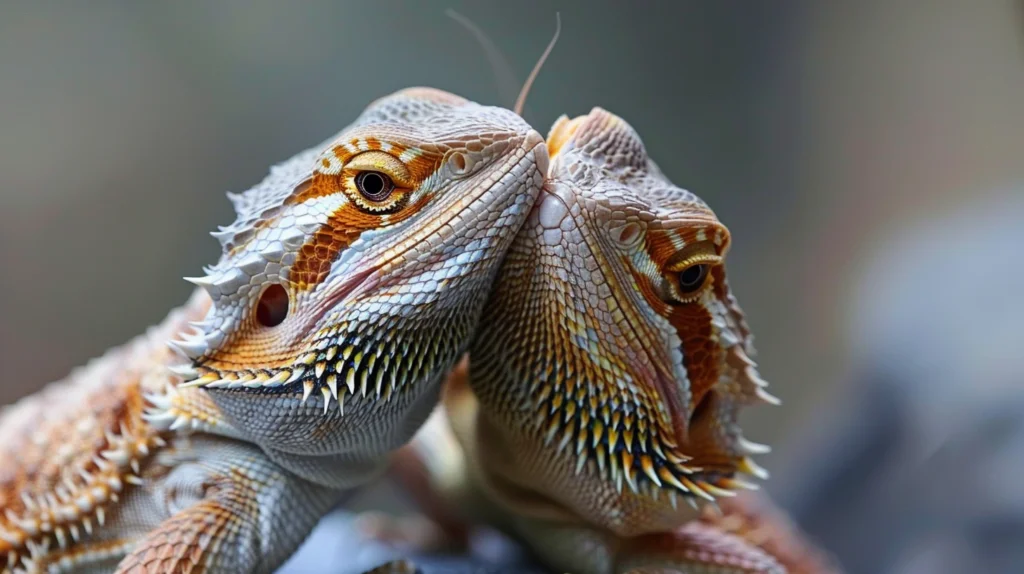
How to Respond When Your Bearded Dragon Licks You
While being licked by your bearded dragon is generally harmless, you should take precautions and positively reinforce the friendly gesture.
Safety First
Always wash your hands before handling your bearded dragon to prevent potentially spreading germs to them via a lick. Also, avoid wearing lotions, perfumes, or sunscreens when interacting with your pet since ingesting such chemicals could cause toxicity.
Practicing good hygiene and avoiding topical chemicals minimizes health risks from licking. Salmonella bacteria occur commonly in reptiles. So habitual hand washing after contact avoids transmittal via licks. Also, bearded dragon tongues contacting skin products could result in indiscriminate ingestion of potential irritants or toxic ingredients.
Monitor time spent outdoors when holding your bearded dragon too. Pesticides from lawns can accumulate on shoes and clothes. Lingering residue getting licked later contributes to toxic accumulation, causing organ damage over time. Always play it safe by having freshly cleaned hands and clothes when interacting with your pet.
Positive Reinforcement
Giving gentle pets or scratches during licking teaches your bearded dragon the behavior earns it affection. It can further strengthen your social bond.
Applying positive reinforcement techniques builds trust and socialization. If your bearded dragon licks then receives pets or treats, it associates those rewards with interaction. This repetition during handling forms connections through operant conditioning.
Over time, the added affection during licking encourages the behavior’s repetition since the bearded dragon links it to pleasurable stimuli. As the bond between pet and owner grows, you may even notice the lick frequency increase along with its overall sociability. For shy or skittish bearded dragons, applying patient, reward-based training helps them become more responsive and engaged with owners.
Redirecting
If the licking becomes excessive, redirect your bearded dragon’s attention with a toy or treat. Just avoid pulling away too suddenly as that may startle them.
Sometimes bearded dragons get fixated on licking one area excessively. Gently redirecting their focus curbs obsessiveness. Offer treats or toys requiring active foraging. This breaks the repetitive licking pattern. Possible distractions include placing bee pollen dots around the habitat for them to chase or acquiring puzzle feeders.
When redirecting, always initially offer a substitute activity rather than forcing them to stop. Aggressive physical redirection risks harming trust. Simple diversions keep handling sessions positive.
Monitor For Stress
Note if licking coincides with darkened beard coloring or other cues of stress or illness. Schedule a vet visit if excessive licking crops up or persists longer than a few days as that may indicate an underlying health issue.
While exploratory licks generally prove innocuous, increased frequency correlated with signs of poor health merits prompt veterinary investigation. Unfortunately bearded dragons often mask symptoms of metabolic bone disease, parasites and other problems until advanced stages.
Pay attention if new repetitive licking pairs with weight loss, lethargy or appetite changes. Catching subtle early indicators before advanced disease progression improves outcomes. Regular wellness checks every six months proactively monitor health too. Vet examinations and laboratory diagnostics detect developing issues.
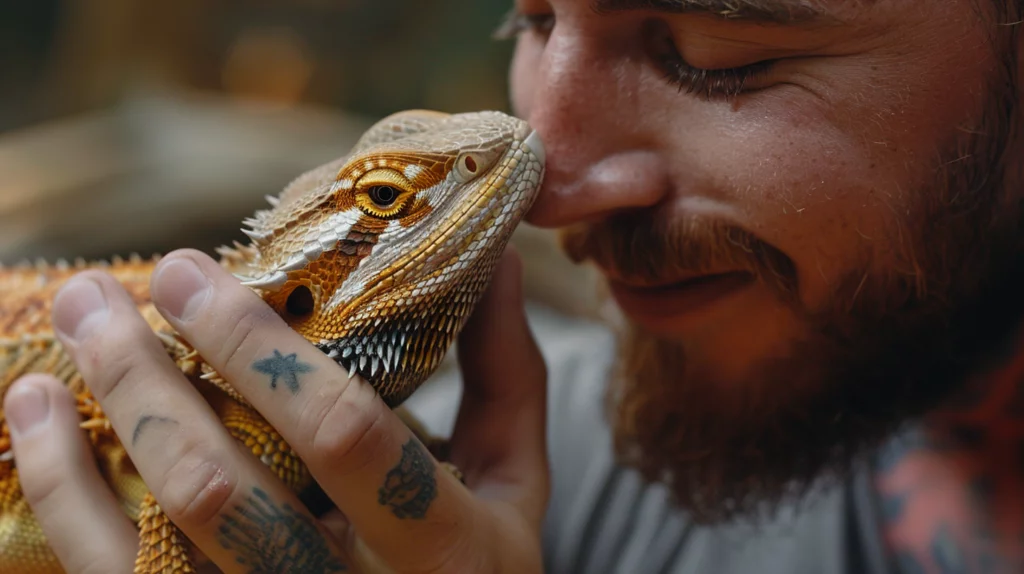
FAQs About Bearded Dragon Licking
New bearded dragon owners often have similar questions about this quirky licking behavior. Below are answers to some frequently asked questions.
Is a lick from a bearded dragon dangerous?
Generally, a single lick poses little risk to humans. Potential concerns include spreading salmonella germs from their mouth or ingesting substances on the skin. But these risks remain low from occasional licks if you practice good hygiene.
Salmonella bacteria occur frequently in reptiles without causing clinical signs, with infection estimates up to 90% in some studies. Good hand hygiene minimizes transmission risk both to and from bearded dragons during handling or licking. Avoiding contact between bearded dragon mouths and open wounds also prevents infections.
Overall, salmonella risk only increases with very young children, immunocompromised persons, or those not diligently washing hands after interacting. Otherwise healthy individuals following proper precautions should feel comfortable letting their bearded dragon lick them without worry.
Why does my bearded dragon lick its lips?
Frequent lip licking usually signals dehydration. It can also occur along with arm waving as a sign of submission. Addressing hydration levels typically curbs excessive lip licking.
Increased lip licking indicates a bearded dragon trying to spread saliva over their mouth region. Salivating wets dry tissue, granting temporary relief. But consistent lip wetting means a too-dry habitat lacking sufficient hydration sources.
Verify the habitat supplies fresh water changed daily in a bowl they can soak in. Mist the tank multiple times daily focusing on decor ridges they lick condensation from. Offer hydrating foods like watermelon too. Once their environment supports adequate hydration intake, the lip licking diminishes.
Can I teach my bearded dragon not to lick me?
Deterring licks risks negatively impacting the bond with your bearded dragon. As licks seldom cause problems, better to enjoy them as a quirk of bearded dragon companionship.
Actively working to stop licking could weaken the trust between a bearded dragon and its owner. Since licks cause no harm, attempting to inhibit the natural exploratory behavior serves little purpose beyond damaging your interspecies relationship.
Much better to appreciate licks as your bearded dragon showing interest in interacting. Redirect if the licking becomes excessive. But otherwise embrace this harmless quirk unique to bearded dragons over more standoffish reptiles.
What does it mean if my bearded dragon licks my other pets?
Inter-species licking still gathers scent information. But it may stress the other pets. Always monitor interactions between household pets closely.
Dogs and cats often react poorly to investigative licks from bearded dragons. Even if the bearded dragon shows harmless curiosity, other pets may view proximity as predatory. Cats especially dislike reptilian movements, batting away lizards while dogs may overreact with fearful aggression.
Never leave bearded dragons unsupervised with other pets. Reptile-mammal interactions pose high risks of defensive biting and clawing from miscommunications. Whether licks get ignored or spur upset, keeping close watch and separating when tensions arise keeps pets safe.
Is a bearded dragon lick similar to a kiss?
While the affection and bonding implied has similarities, bearded dragon licks serve practical functions like scent detection rather than expressing love. So interpret licks more as your bearded dragon exploring its environment safely than giving kisses.
Certainly licks may reflect a bearded dragon’s comfort and familiarity with its owner. But assigning emotional intent risks anthropomorphizing normal reptilian behaviors. Enjoy your bearded dragon licks as signs of curiosity about smells, not displays of affection. Their licks still represent friendliness, just not in the exact same manner as a human or mammalian kiss.
In Summary…
When your bearded dragon flicks its tongue out to lick you, it gathers chemical cues about smells, signals comfort with interacting, and possibly obtains beneficial skin nutrients too. Licks pose minimal risks with proper handling hygiene. You can positively reinforce the friendly behavior through redirection and rewards. Simply observe for any stress indicators or persistence of excessive licking that necessitates veterinary guidance. Otherwise enjoy your bearded dragon’s quirky licks as you bond with your scaly companion!
